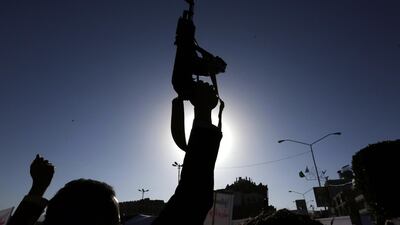The geopolitics of the Yemen conflict are at an impasse just as intractable as the battlefield itself, but the signs are the dam is set to break.
An outside observer who follows the country closely recently described the diplomacy that surrounds it as a knife fight in the dark. Dismal though the prospects, appeared multiple rounds of talks and conferences have convened. The result always was words not action.
Last week truly changed the dynamic within the country. Ali Abdullah Saleh was a fascinating wheeler-dealer and his removal reduces the dimensions of Yemen’s power struggle.
It is worth exploring a rapid shift in the wider landscape and if developments can now move in tandem.
Two White House statements in recent days and comments by Rex Tillerson demanded unfettered humanitarian access to Yemen. These interventions represent a sudden stiffening in language and give the appearance of a tit-for-tat for Saudi Arabia’s strong criticism of the Jerusalem embassy announcement.
The statements are more consequential than a passing jab. What if the stalemate over Yemen is no longer viable? Shouldn’t this mean the demise of sterile communiques in favour of a proactive steps that can end the conflict?
Events on the ground could soon follow the logic that the Houthis have overplayed their hand. The outside focus must then evolve away from well-practised pleading, an understandable yet inadequate stance.
True, pressure has steadily risen on western politicians to acknowledge Yemen’s predicament in foreign policy. Charitable campaigns for famine relief and the images of the cholera epidemic have had strong resonance among the European and American public.
Combined with greater scrutiny on rising arms exports and assistance to the Saudi-led coalition, Yemen has become an increasingly visible issue.
The political leaders have chosen to respond by signaling their concerns. Even before the White House statements, Theresa May was forced to make Yemen a leading theme of her trip to Saudi Arabia where she discussed the issue with King Salman.
In the meeting rooms, humanitarian negotiations have however dragged. Various formulae have been proposed to ensure more aid is trans-shipped into Yemen, including opening up new supply lines from Saudi Arabia.
Forcing the Houthi commanders to relinquish control at Hodeidah would be truly transformative. Once the corrupt warlords are removed, UN needs to set up a robust independent supervision mechanism at the port and over the distribution of aid at key points around Yemen.
There are already, according to Jamie McGoldrick the UN representative on the ground, 15 laden ships in the Red Sea ready to dock.
Over 22 million Yemenis need humanitarian assistance and more than eight million are on the brink of famine. A functioning secure port is desperately needed to facilitate much greater access.
____________________
Read more from Opinion
Strategy shift begins to yield results for Saudi Arabia and its allies
Shelina Janmohamed: Daring to wear it: modest fashionwear is a bold choice
____________________
Breaking this impasse would also clarify the dividing lines in the conflict.
Yemen has a unique culture and a mellifluous charm. But anyone trying to feed a family in circumstances of hardship, knows there is a limit to the consolation that can be taken from this. You cannot eat the view.
The country’s greatest asset is its strategic location. The gateway to the Red Sea can either prosper or suffer the blight of its circumstances.
That location has not gone unnoticed in Tehran. In an obvious pincer movement Iran has an agenda of supremacy both there and in the eastern Mediterranean through Syria and Lebanon.
Breaking through with the pent-up supply of humanitarian imports would do more than alleviate suffering in Yemen.
Substantial movements could free up the diplomacy. Conferences could turn to the security agenda as well as bringing new light to problems of Yemen’s economic development.
Coherent pressure against the Iranian manipulation of the conflict is vital. Yemen should not be a platform from which to attack naval vessels or international tankers moving across the Red Sea.
Still less should it be a launching pad for sophisticated missiles with a range of hundreds of kilometres to target a neighbouring country.
The dispute in Yemen is a matter of clashing personalities and differing political ideologies. Fundamentally it is a part of a scramble for scarce resources in which the competing impulses of corruption and patronage constantly overwhelm a fragile state.
Even before the government was driven out by the Houthi rebellion, the country was hardly viable.
It does not have enough water to sustain its population. Its development challenges are myriad.
A total takeover – as reports now emerging from Sanaa suggest – by a foreign-backed, tribal and sectarian movement does nothing to get Yemen beyond its morass.
Yemen’s only real advantage is its location. It can enjoy the benefits again. For that it needs both the right movement on the battlefield but radically different international efforts to end the crisis.

